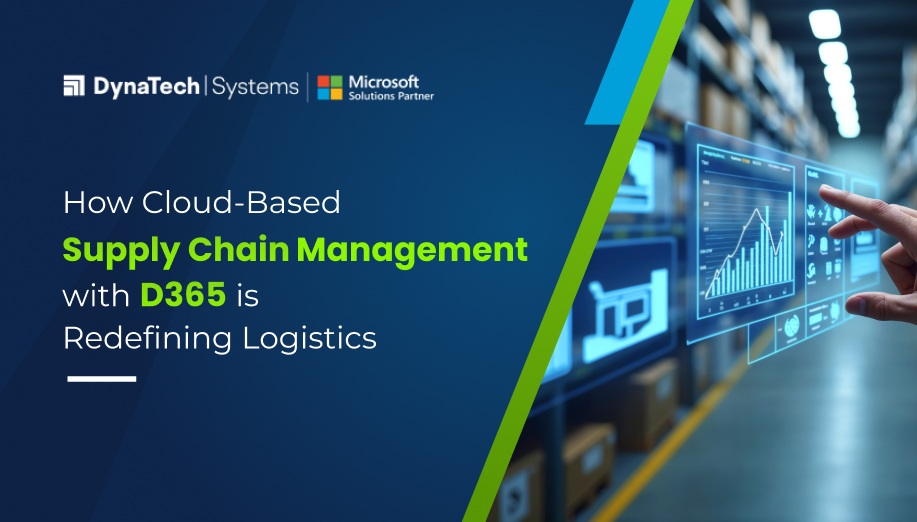Picture this: a global retailer is ready to launch its holiday season campaign. Ads are running, orders are flowing in, and then a shipment delay in Asia throws everything off. Shelves stay empty. Customers get frustrated. The ripple effect costs millions.
This isn’t a one-off disaster. It’s an everyday challenge for modern logistics teams operating in a world of fragile supply chains, geopolitical shifts, and sudden demand spikes.
Resilient Logistics via Cloud Supply Chain Management
Now imagine a different scenario. One where intelligent systems spot the delay early, reroute inventory in real time, and notify stakeholders instantly. That’s the promise of cloud-based supply chain management powered by Dynamics 365 Supply Chain.
This blog explores how cloud-first logistics with D365 Supply Chain Management is not just improving operations. It’s redefining how businesses think about agility, responsiveness, and resilience in the modern supply chain ecosystem.
The Drastic Shift: From Static to Dynamic Logistics
Traditional supply chains were built for predictability. However, modern supply chains operate in an environment where delays, disruptions, and demand shifts are the norm. To navigate these realities, businesses need more than just data. They need intelligence, speed, and integration.
Cloud-based supply chain management provides exactly that. With D365 Supply Chain Management (SCM), organizations can eliminate data silos, track operations in real time, and react faster than ever before.
And because it’s built on the Microsoft cloud, businesses benefit from a single platform that unifies inventory, procurement, warehousing, manufacturing, and transportation, all while staying scalable, secure, and accessible from anywhere.
What Makes Dynamics 365 Supply Chain a Game Changer?
At the heart of Microsoft Dynamics 365 logistics lies a powerful engine that combines automation, IoT, AI, and predictive analytics. It doesn’t just give you insight into your supply chain. It helps you act on it.
Here’s what sets Dynamics 365 SCM Cloud apart:
1. Real-Time Visibility Across the Value Chain
Track inventory levels, shipments, production status, and demand forecasts from a single dashboard. No more waiting for batch updates or manually reconciling spreadsheets. Everything updates in real time, giving teams the insight to make fast, confident decisions.
2. Intelligent Demand Forecasting
By leveraging built-in AI, D365 Supply Chain Management helps forecast demand with greater accuracy. It accounts for seasonality, market shifts, and even external disruptions, so your planning team always stays a step ahead.
3. Proactive Risk Management
Supply chain disruptions are inevitable, but their impact doesn’t have to be devastating. With predictive alerts, vendor scoring, and transportation insights, you can identify risks before they escalate and reroute operations accordingly.
4. Integrated Warehouse and Transportation Management
Microsoft Dynamics 365 logistics combines warehouse and transportation into a unified platform. From optimizing picking routes to choosing the most efficient delivery carriers, every movement becomes more efficient and cost-effective.
5. Global Scalability
Operating across multiple countries? No problem. Dynamics 365 supports multi-language, multi-currency, and multi-region capabilities, allowing organizations to scale their logistics operations without friction.
Real-World Benefits That Matter
Companies that implement cloud-based supply chain management with D365 typically see:
- Faster order processing due to automation and real-time data
- Reduction in inventory holding costs through better forecasting
- Fewer stockouts or overstocks, thanks to predictive analytics
- Significant reduction in manual labor, freeing teams to focus on strategy
- Improved vendor and customer satisfaction through streamlined communication
These aren’t just improvements in operations. They’re improvements in profitability and customer loyalty.
Why Cloud Is the Only Future-Proof Option?
Let’s face it. On-premises systems simply can’t keep up with today’s supply chain demands. They’re expensive to maintain, hard to update, and slow to integrate with modern tools.
Cloud-based supply chain management offers:
- Anywhere, anytime access for global teams
- Automatic updates with the latest features and security patches
- Faster integration with emerging technologies like AI, IoT, and machine learning
- Elastic scalability, whether you’re managing five SKUs or five million
With the global supply chain becoming increasingly complex, only cloud systems can offer the speed, resilience, and agility businesses need to thrive.
In Conclusion: Logistics Built for What’s Next
Modern supply chains need more than just efficiency. They need intelligence, speed, and adaptability. With Dynamics 365 Supply Chain Management in the cloud, businesses can shift from reacting to disruptions to staying ahead of them.
If your logistics still rely on outdated tools, now is the time to evolve. Smarter, cloud-driven supply chains are not just an upgrade. They are essential for staying competitive in a fast-moving world.
